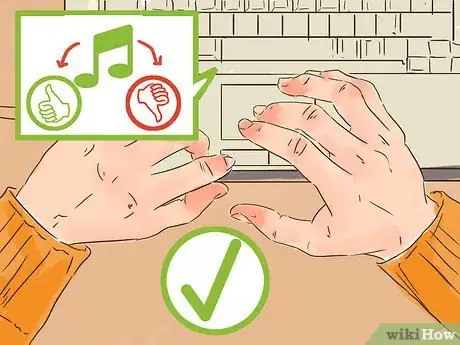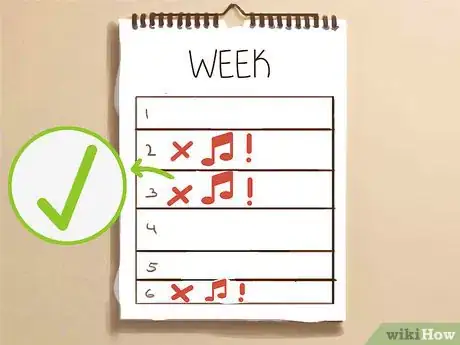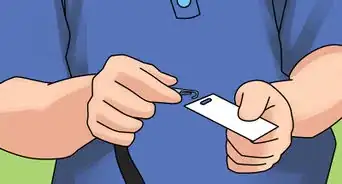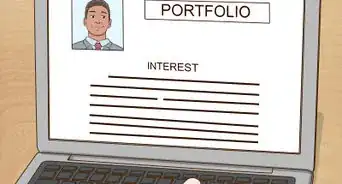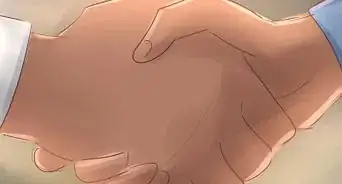This article was co-authored by Gerald Posner. Gerald Posner is an Author & Journalist based in Miami, Florida. With over 35 years of experience, he specializes in investigative journalism, nonfiction books, and editorials. He holds a law degree from UC College of the Law, San Francisco, and a BA in Political Science from the University of California-Berkeley. He’s the author of thirteen books, including several New York Times bestsellers, the winner of the Florida Book Award for General Nonfiction, and has been a finalist for the Pulitzer Prize in History. He was also shortlisted for the Best Business Book of 2020 by the Society for Advancing Business Editing and Writing.
There are 8 references cited in this article, which can be found at the bottom of the page.
This article has been viewed 58,834 times.
Music journalism is a fast-paced, exciting profession that offers those who eat, sleep and breathe music a chance to get involved on the inside. It’s not an easy business to break into, however. Competition is fierce, and it can be daunting to know where to begin. You must have a passion for music, stay informed on all the latest news and releases and be willing to devote your time and energy to developing your writing skills. With patience, a positive attitude and a lot of hard work, you can realize your dream of turning music appreciation into your career.
Steps
Building the Necessary Skills and Education
-
1Start writing music reviews. The first thing you should do once you’ve decided to begin a career in music journalism is begin building experience doing the thing you want to do: writing about music. Draft up reviews of your favorite albums and record your thoughts on live shows. Develop an eye for detail and take your own work seriously, even if you’re only doing it on an amateur level.[1]
- Think of your early reviews as training. Aim to express your ideas in a clear and engaging way. Make each and every piece say something, even if no one is reading it.
- The more you know about the music you’re reviewing, the better. With a greater scope of knowledge, you’ll be able to better make objective criticisms and comparisons and zero in on what’s good and bad about a song, album or performance.[2]
-
2Stay current on music-related news. Journalism is a round-the-clock job—the same holds true for critics in the music industry. When you’re not writing about music, you should be researching it. Stay up to date on the activities of major artists, pay attention to big announcements and pick up new releases when they come out. When researching news of the music world, you’re mining for material to use in your work.[3]
- Research is an important part of any journalist’s daily duties, and may be even more time-consuming than actually writing.
Advertisement -
3Read high profile music publications. Become an avid reader of the big print reviewers like Rolling Stone, as well as online publications such as Pitchfork and Stereogum. These news outlets will give you an idea of the style and content that editors are looking for. You’ll also learn more about music in the process, helping you on your way to becoming an expert in your craft.[4]
- The articles that get published in influential sources tend to be the best of their kind. What stands out to you about their style and message? What do they seem to have in common?
- Be on the lookout for career openings with the publications you read.
-
4Earn a degree in journalism or communications. Consider enrolling in a writing-focused bachelor’s program at your local community college or university. While it’s not strictly necessary to hold a degree in order to succeed as a music critic, it will only add to your credentials. The type of work you do in school will also hone your language skills and may even provide opportunities to make contacts that will be able to help you out in the future.[5]
- If a hiring choice ever comes down to you or someone else, having a degree might be just the edge you need to win out.
- Decide whether the time and expense of going to school would be worth it to you, or if you’d be better off using your energy to build practical experience. Many notable music journalists have risen to the top of their field without the benefit of a college degree.[6]
Gaining Experience
-
1Refine your writing style. Write a lot. Practice makes perfect. Concentrate on composing clips (critical pieces that include reviews, interviews, features and editorials) with a concise, punchy style that will grab people’s attention and make them take note. Learn how to write fast to simulate working under a deadline. Resume listings are a bonus, but nothing matters more to the hiring directors at music publications than how solid a contributor’s writing is.[7]
- Observe what you like about the articles you read on prestigious websites and magazines and try to incorporate those traits into your own writing.
- Your writing should say something unique about the music itself.
-
2Build your portfolio. As soon as you’ve begun writing clips, compile them into a portfolio that you can show off to interested parties. Having samples of your work collected in one place makes it easy for prospective employers to assess your style and determine whether you would be a good fit for their publication. Choose your strongest work to go into your portfolio. Once you start applying for work, you can send in selections to go along with your work experience.[8]
- Start a blog. The majority of music journalism is conducted via the internet these days. A well-designed, popular blog with a memorable title that’s full of good writing will serve as a commending portfolio itself.[9]
- It’s fine if most of your writing is published online, but having physical copies of your work that you can hand out is a definite advantage.
-
3Get involved in your local music scene. Establish a reputation in your town by putting yourself on the frontlines of your local music scene. Be in attendance at every show you can and be sure to jot down your thoughts. This is a great way to start meeting other journalists, music managers and even artists themselves. Some cities even have small periodicals that specialize in covering local musicians and venues. Working for or with one of the periodicals would be a great way to break into the business.[10]
- If a publication worth writing for doesn’t exist in your area, create one yourself. Zines are still fairly popular in niche and underground music scenes, and you can circulate them where you think they’ll get the most attention.[11]
-
4Submit your clips to different websites and magazines. When you think your work is good enough to be read by a larger audience, ship it off to the submissions departments of various music news outlets. This can include print sources and online publications. Tell them a little about yourself and your passion, and be sure to include samples of the clips you’ve worked on. If an editor thinks you would make an asset to the publication, they’ll most likely hire you.[12]
- Know who to get in contact with and where to send your work. You’ll appear more professional and organized than if you carpet bomb every email address you come across with writing samples.[13]
- Don’t be afraid to make cold calls to a publication you want to work for, or simply show up. It will highlight your ambition and make it clear that you’re willing to do what it takes to get where you want to be.
Advancing Your Career
-
1Make industry contacts. Forge friendly professional relationships with the people that you come into contact with while getting your start. Try to remember every name and face you encounter, as you never know when someone might be able to assist you down the line. Be kind, courteous and easy to work with. When people witness how serious your interest in music is, they’ll keep you in mind when there’s important work to be done.[14]
- Success isn’t all about who you know, but it can definitely help to be well-connected. It never hurts to have too many friends.
- Be eager to perform favors for people whenever you have the chance. They may be able to return the favor by giving you a leg up.
- Do your best to make a good impression. People remember who they like… and who they dislike.
-
2Offer your services freelance. You may not get hired on with a reputable publication right away, but that doesn’t mean you can’t still make a living as a music journalist. Keep producing clips and look for places where you can find freelance work. Many websites and smaller publishers accept guest contributions. It can be hard to find consistent work as a freelance agent, and you may not get paid much, but don’t be discouraged. The important thing is to keep your name out there and receive as much exposure as you can.[15]
- Writing freelance can be a great way to supplement your income as a journalist. You may even be able to find enough work to transform it into a full-time gig.
- There may also be opportunities to use your writing skills to come up with the bios and press materials for themselves musicians themselves. Contact an artist or their representation directly to see if they could use you.
-
3Put in time with a music news outlet. If you are fortunate enough to be offered a job at a music review publication, then you already have one foot in the door. Buckle down and prepare to work your way up the ranks. Be loyal and committed to your team and always make sure that you’re putting out your best work. Your efforts won’t go unnoticed. After you’ve served some time, yours may be one of the names thrown in the hat for a raise or promotion.[16]
- Keep a positive attitude and be productive, even if you have to start out in the mail room or making coffee. Your personality and work ethic will be the biggest factors in how far you go.
- Look for ways to constantly improve yourself so that your work continues to stand out even after you’ve established yourself.
-
4Become an editor. Editor is the most coveted position for most journalists. If you work hard enough for long enough, reaching the level of editor is an attainable goal. As an editor, you’ll have the power to select articles for publication, oversee the work of staff writers and even author special interest pieces on topics of your choosing. Editors also stand to receive many other perks, including free concert admission, backstage passes, advance news and music releases and chances to interview artists.[17]
- Once you’re an editor, your experience will speak for itself. You’ll be able to take your talents to other news outlets and publications as you see fit.
Warnings
- Music journalism is an industry made up primarily of freelance agents. While some outlets have dedicated staff writers, most material is submitted by part-time contributors. As a result, it can be tough to score a long term, dedicated position.⧼thumbs_response⧽
- Don't expect to get rich as a music journalist, especially when you're first starting out. Writers are often paid modest sums for their clips, and freelance work can be scarce. You might be offered a chance to have your writing published, but for little or no pay. Embrace every opportunity to get your work seen. Once you're a little more well known, you can take your talents to bigger publications and expect better pay.⧼thumbs_response⧽
Expert Interview
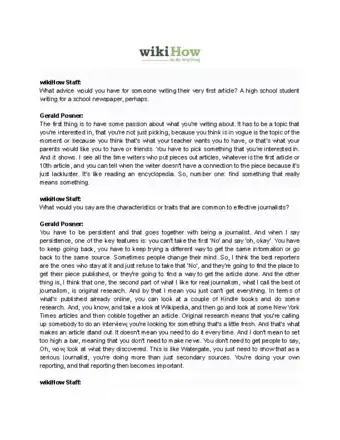
Thanks for reading our article! If you'd like to learn more about writing as a career, check out our in-depth interview with Gerald Posner.
References
- ↑ http://www.npr.org/sections/allsongs/2013/08/08/209957767/the-good-listener-how-do-you-break-into-music-journalism
- ↑ https://www.theguardian.com/careers/music-journalism-best-of
- ↑ https://www.careersinmusic.com/music-journalist/
- ↑ http://www.allyoucanread.com/top-10-music-magazines/
- ↑ https://www.careersinmusic.com/music-journalist/
- ↑ http://www.npr.org/sections/allsongs/2013/08/08/209957767/the-good-listener-how-do-you-break-into-music-journalism
- ↑ https://www.journalism.co.uk/skills/how-to-get-into-music-journalism/s7/a552475/
- ↑ https://www.careersinmusic.com/music-journalist/
- ↑ http://mashable.com/2010/08/07/music-blogging-tips/#rASRYxVdpmqM
- ↑ https://www.journalism.co.uk/skills/how-to-get-into-music-journalism/s7/a552475/
- ↑ http://www.rookiemag.com/2012/05/how-to-make-a-zine/
- ↑ https://www.thebalance.com/music-journalist-career-profile-2460638
- ↑ https://www.theguardian.com/careers/music-journalism-best-of
- ↑ http://www.npr.org/sections/allsongs/2013/08/08/209957767/the-good-listener-how-do-you-break-into-music-journalism
- ↑ https://www.theguardian.com/careers/music-journalism-best-of
- ↑ https://www.careersinmusic.com/music-journalist/
- ↑ https://www.careersinmusic.com/music-journalist/
About This Article
To become a music journalist, you’ll need to know a lot about music and music theory, so try to read as much as you can about music and listen to a variety of genres to train your ear. You can also read high-profile music publications to get an idea of the style editors are looking for, then practice writing reviews, interviews, features, and editorials. Also, work on building your portfolio by starting a music blog and publishing your work on it. To learn how to find jobs as a freelance music journalist, scroll down!
